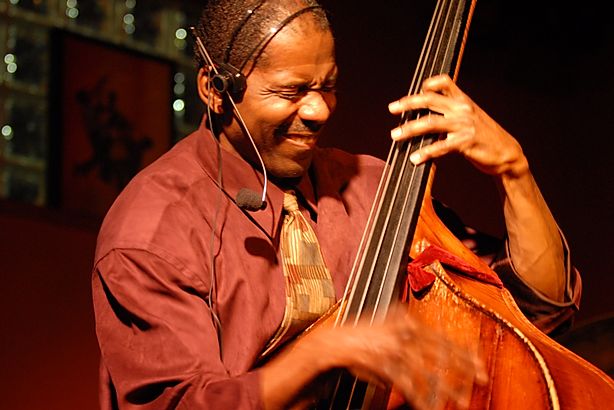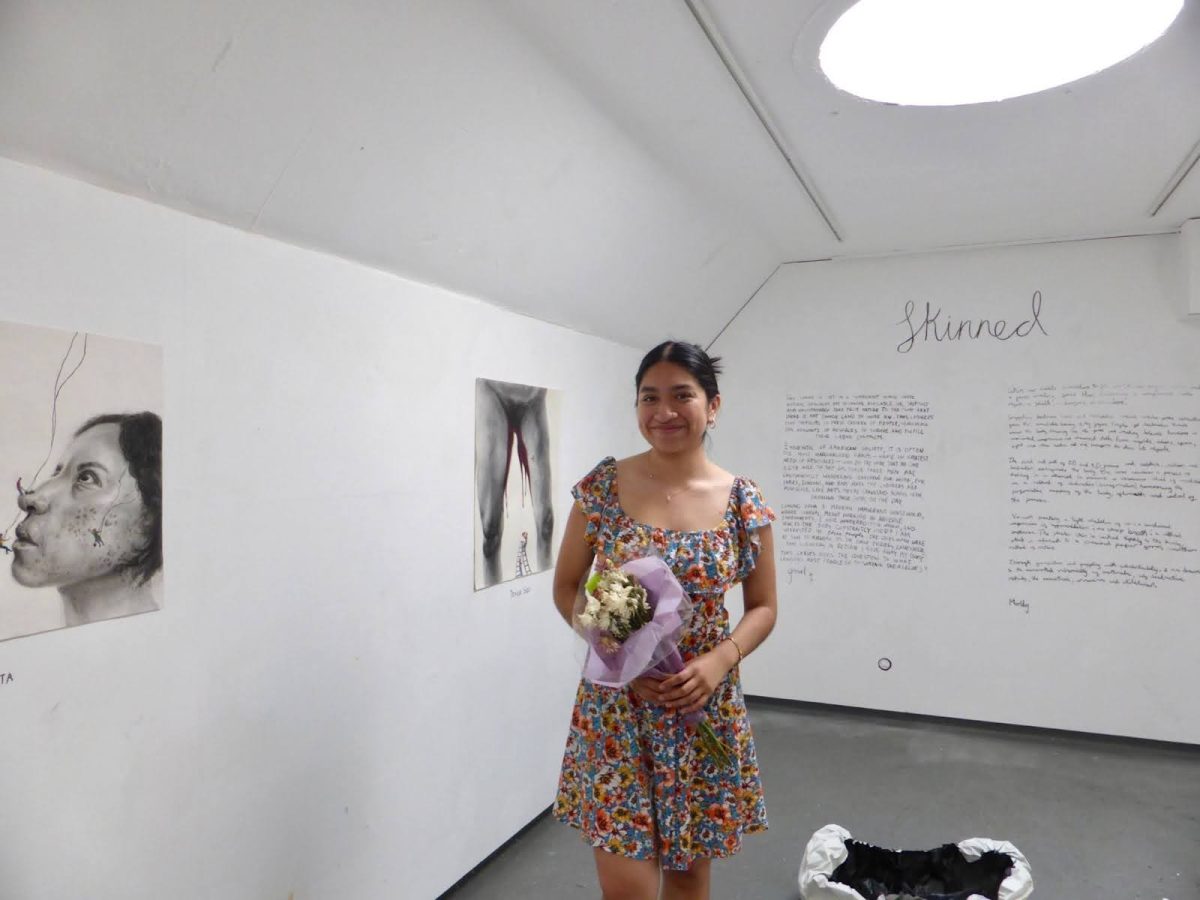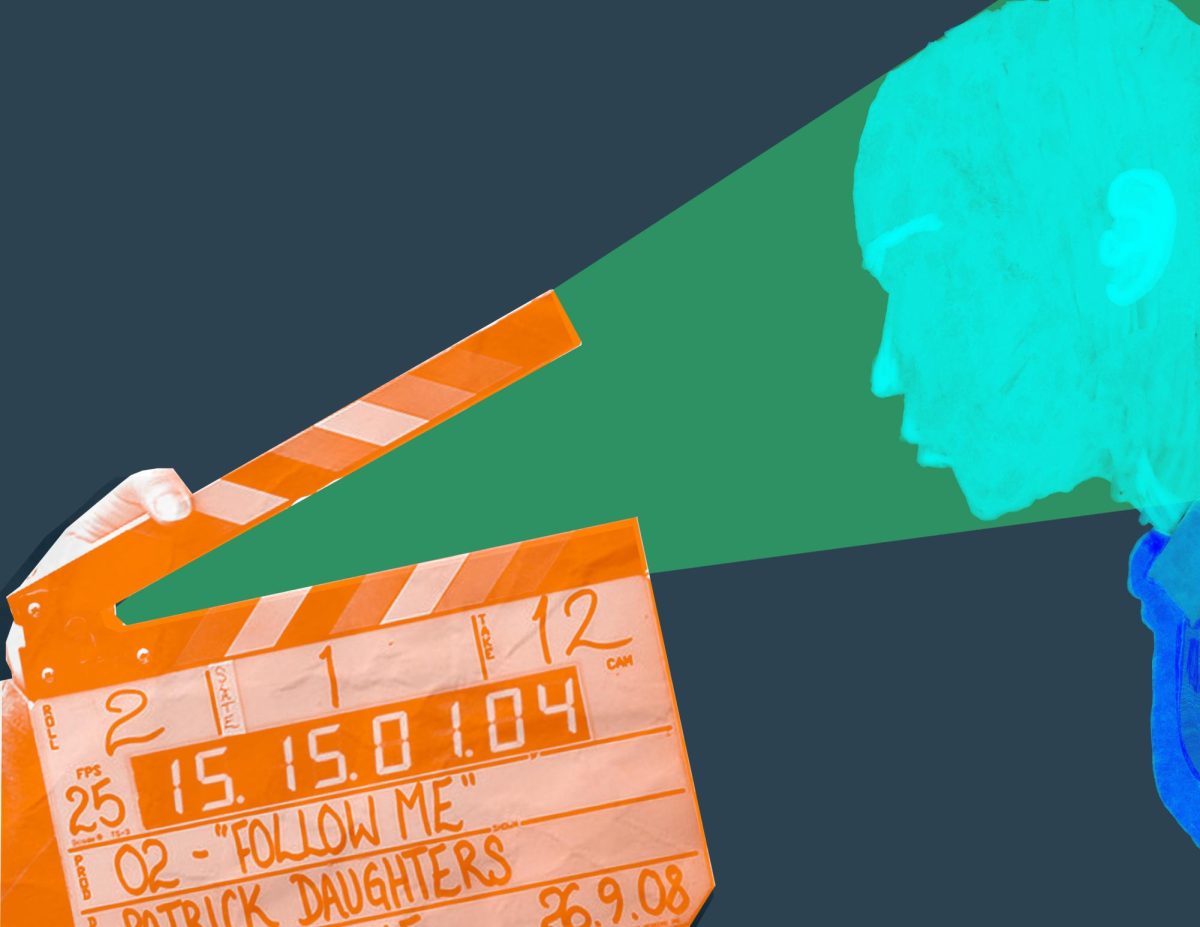
A silence settles over Brooks-Rogers Recital Hall.
Through this silence cuts the low thrum of a bass, fingers racing across taut strings. As it finishes its line, the djembe, a type of West African drum, enters in, tapping out a staccato melody.
The two instruments have a conversation — one talks, the other listens. Their thoughts slowly grow more complex, and their movements become ever more synchronized. Soon they are all but playing in unison, still improvising, but as one voice, the bass and the djembe interlocking and overlapping.
They rumble ever louder — the drummer looks to them for a signal he knows will soon come — the two voices are barely distinguishable from one another — crash!
It’s Avery Sharpe’s last semester at the College, and he’s going out in style.
Sharpe, who is retiring this year after 10 years teaching bass, leading jazz ensembles and advising the College’s gospel choir, held a performance of his album 400 last Thursday alongside a band of fellow music professors, students and guests. The album, which was released in 2019, includes 10 songs, nine originals and one arrangement, and was designed to encapsulate 400 years of black history in America.
Sharpe said that he came up with the idea for the album several years ago, when he ran into a friend at Whole Foods. “She [Sharpe’s friend] goes, ‘You know, 2020’s coming.’ And she goes, ‘2019,’” Sharpe recounted. “I immediately knew what she meant, because 1619 was when Africans were first brought to U.S. shores. I just had this glassy look in my eye, and she knew I wasn’t listening to her anymore. I started hearing all this creative stuff.
“400 years for black folks to be in this country, it’s monumental,” he continued. “I was thinking, how could I commemorate this? It’s not a celebration, it’s just a statement of fact of what has happened.”
After Sharpe decided on a musical commemoration, he still faced the problem of condensing such a long and complex history. “How do I put this project together?” he asked himself. “How do I turn 400 years into 60 minutes’ worth of music?”
He tackled the daunting task by first splitting 400 years of history into centuries, and then writing two or three songs for each century. The album, as well as Thursday night’s performance, started at the beginning: the arrival of African slaves in what was then British colonial territory.
“Arrival,” which Sharpe highlighted as one of his two favorite songs from the album, charted the journey across the Atlantic to American shores. The song featured Sharpe on bass, Tendai Mupatutsa on djembe, Kris Allen on saxophone, Haneef Nelson on trumpet, Matt DeChamplain on piano, Royal Hartigan on drums and a choir consisting of Samirah Evans, Theophyl Kwapong ’20, Morgan Whaley ’20, Ashley Villarreal ’20 and Jazmin Bramble ’20.
During the song, images of chains, enslaved people and slave ships played on a projector screen behind the performers; each piece throughout the night had different images chosen specifically for that song.
Next came “Is There A Way Home,” which Sharpe said arose from a question he would asked himself if he were in the position of enslaved Africans: “How do I get home?” The choir sang lyrics in English and a Liberian dialect which Sharpe said was inspired by his sister-in-law. After “Is There A Way Home” came “Colonial Life,” a serene but mournful meditation on slavery during America’s colonial period.
For “Fiddler,” the next piece in the program, Sharpe was joined by Kevin Zhou ’20 and Jeongyoon Han ’21 on violin, Andrew Rim ’20 on cello and Hartigan on drums [Editor’s Note: Han is a managing editor of the Record]. The song was the first of many emphasizing the importance of black Americans in American musical history; Sharpe challenged his audience to “try to hear American music without African or African American influence.”
The 19th century, third in Sharpe’s broad century-long categories, was portrayed in two songs. On “Antebellum,” the choir took center stage with no backing instrumentals, which Sharpe said was inspired by “spirituals” — “we call them spirituals now,” he explained, “but back then they called them slave songs.”
For Sharpe, who has a background in gospel music, religion was an inextricable part of the story he was telling, and the song’s refrain reflected this: “We’re gonna wake up, rise up, with the help from my Lord.”
Meanwhile, “A New Music” continued Sharpe’s focus on the black musical tradition, especially on ragtime music, which was popular at the turn of the century.
As the 20th century began in earnest, Sharpe turned his focus to the Harlem Renaissance and World War I in “Harlem and The War to End All Wars,” a highlight of the night. And in “The Blues and World War II,” Sharpe’s personal story entered into the picture through his father.
Sharpe’s father, who fought in World War II and the Korean War, encountered a brutal disconnect between his service abroad and reception at home. “You have a lot of black males of his generation that came out of World War II after fighting for ‘freedom’ for America but did not experience those freedoms,” Sharpe explained.
“The radical side of me comes from my father,” Sharpe continued. Born in the South in 1954, Sharpe’s family briefly moved to Plattsburgh, N.Y., when he was a child before settling in Springfield, Mass.
“Ain’t Gonna Let Nobody Turn Me Around,” the second-to-last song in the program, was the only song not written by Sharpe himself. “When I got to [the Civil Rights] era,” Sharpe said of his own writing, “everything sounded kind of corny to me.” So instead, he decided to do an arrangement of “Ain’t Gonna Let Nobody Turn Me Around,” a spiritual that was popular during the 1960s.
The song was also unique in that it featured an extended spoken-word section. Evans, who also sang in the choir during the piece, read what can perhaps best be described as a poem-slash-declaration on black history and agency: “I am black, I am American… I will not back down!”
Last came “500,” which Sharpe said was another one of his favorites from the album. More musically complex than any song before it, “500” showcased twisty horn lines and a 7/4-time signature in an auditory attempt to convey the potential of the next 100 years in black America. Behind the musicians, images of Barack and Michelle Obama, Ava DuVernay, Ta-Nehisi Coates and the cast of Black Panther flashed across the projector screen.
“I did this project as a reminder that this should never happen again, to any group of people,” Sharpe said of 400 before the night’s last song began. “We still haven’t really come to grips with what happened.”
The performance may be Sharpe’s last at the College, other than the biannual faculty concert, before he departs at the end of the semester. Prior to joining Williams faculty, Sharpe was a full-time musician, performing with jazz greats such as Max Roach, Archie Shepp and Yusef Lateef.
In an interview, Sharpe recounted how he had come to Williamstown for jazz concerts before Andy Jaffe, who knew he was interested in teaching, offered him a position as a bass teacher.
“Andy called me up, he said, ‘Look, man, why don’t you think more about teaching?’” Sharpe recalled. “So, I said, ‘Well, Andy, I love what you’ve done with the jazz program here. It’s still growing, and yeah, I’d come here and help you out.’”
Soon afterwards, Sharpe took on additional roles as the leader of a small jazz ensemble and as faculty advisor to the gospel choir, which he helped integrate into the music department. Just this past year, Sharpe took on leadership of a second small jazz ensemble.
“It’s been good, it’s been different,” Sharpe said of his time at the College. “I always look at life as a learning experience. I learned, while I was here, about people, about systems and about myself.”
As for what Sharpe will do after he leaves: “I’m basically gonna be doing what I’ve always been doing, and that’s special projects, like 400,” he said. “I’ve written for plays, I’ve written for films — I do a whole lot of writing, and I like large projects.”
At the end of Thursday’s concert, Sharpe did something rather unusual. As he announced the band from the stage, he encouraged the audience to clap along — not in itself strange, except that the song playing behind him was still in the awkward time signature of 7/4. The many applauding spectators looked around at each nervously, unsure of how to follow along with such an unexpected rhythm. But Sharpe guided them through it just fine.







